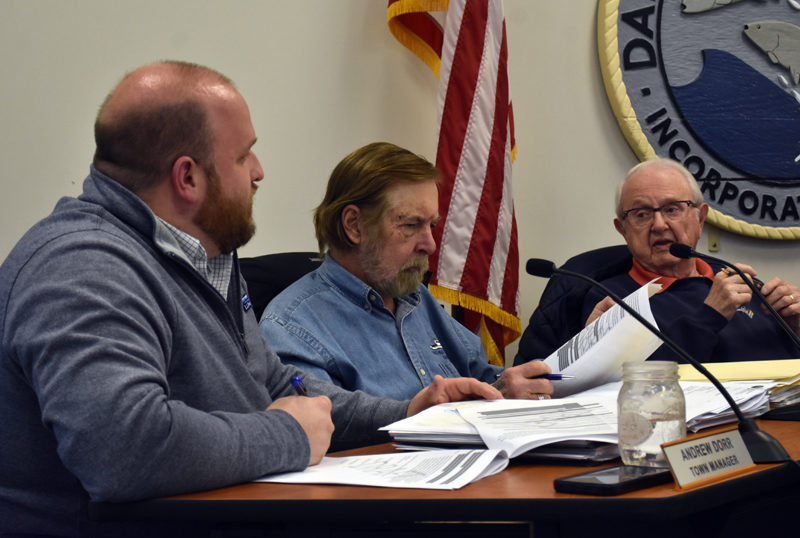
From left: Town Manager Andy Dorr reviews documents with Damariscotta Select Board members Tom Anderson and Lou Abbotoni during the board’s meeting on Wednesday, April 5. (Elizabeth Walztoni photo)
The Damariscotta Select Board discussed the possibility of a six-month moratorium on new aquaculture leases at its Wednesday, April 5 meeting, citing environmental and navigation concerns on the Damariscotta River. If a moratorium ordinance is put before voters, the town would join others in Lincoln County and the state using this method to pause applications issued by the Maine Department of Marine Resources.
Leases for aquaculture projects are issued by the department. Comments are accepted during application review, but authority to approve or deny the applications rests with the state. The sites, of varying size, can be leased for as long as 20 years and may be extended.
Moratoriums have been enacted across Maine in recent months by towns, including South Bristol, that aim to pass permanent ordinances limiting or otherwise guiding project approvals using home rule laws. Waldoboro residents will vote on a moratorium at annual town meeting in June.
Damariscotta select board members discussed difficulty for boaters on the river through highly concentrated lease sites near town — 16 within one mile — and suspected environmental impacts on soft shell clams and other river wildlife.
“We’re not trying to shut down the aquaculture industry. We’re trying to say, ‘Look, can we work together and not completely swallow up this one section of the river?’” member Tom Anderson said.
The board reviewed a map of existing lease locations and historic soft shell clam landings in pounds along the river.
“It’s kind of bottomed out,” Town Manager Andy Dorr said of landings in the last 10 years.
According to Maine Department of Marine Resources data, 624,883 pounds of soft shell clams were harvested in Damariscotta in 2008. In 2021, the most recent year for which data is available, that number was 46,646.
Board Chair Daryl Fraser said he would like to have more information and a clearly stated goal before pursuing a moratorium, and to include those involved in aquaculture in the conversation.
Dorr also said Damariscotta could consider reinstating conservation requirements for shellfish licenses, which the town’s shellfish committee lifted in 2015. Neighboring towns including South Bristol and Waldoboro require minimum hours of conservation work for harvesters to maintain their licenses.
Action was not taken on either subject at the meeting. Members said they would meet with the town shellfish committee and other parties to determine clear goals for a possible moratorium.
In other business, Anton Lahnston and Jean Moon, of the Public Safety and Accessibility Collaborative, asked the select board to find room in the municipal budget to paint town crosswalks, particularly the four on Main Street in downtown, twice a year rather than once.
Lahnston said the crosswalks are “pretty much invisible at this point,” and Moon said visitors to town will walk out into the street if they do not see a crosswalk.
“It’s more costly in the end if someone is injured,” she said.
Fraser said the board would have to investigate the cost.
Later in the meeting, while reviewing a request from the Damariscotta Police Department to sell unneeded town-owned items, Anderson made a motion to use the proceeds for crosswalk funding. The request from Damariscotta Police Chief Jason Warlick asked for authorization to sell unused items that have been in storage and deposit proceeds in the department’s capital reserve funds.
Anderson’s motion passed 3-2, with Lou Abbotoni and Andrea Keushguerian voting in favor and Fraser and Josh Pinkham voting against. Fraser expressed concern about the logistics of moving funds from the police department over to the highway budget. Pinkham said the funds already having been promised to the police department. Dorr will investigate the legality of the vote.
Dorr said work is still in process to add the Great Salt Bay Sanitary District as a co-recipient of the Economic Development Administration grant that funded sewer line construction under the municipal parking lot in 2020. The board voted to transfer ownership to the district, but it was not listed as a co-recipient on the original grant, which stopped the transfer.
Ownership transfer can be finalized once the grant terms are altered. Dorr said he expects the grant process to be completed this month and come before the district’s board of trustees for agreement approval in May.
The Miles Street causeway work is underway with a projected end date in mid-June.
Engineers will stop in randomly at the project every week to total 16 to 20 inspections of various lengths to ensure work is completed to specifications and the materials will be tested to ensure they meet specifications, he said.
The select board also reviewed adjustments to the structure of the annual town meeting warrant.
Dorr said estimated revenue accounts have included state reimbursements to be approved by voters, even though their use is required by the state.
He said the previous arrangement could lead to double accounting, and the town’s auditor found about $20,000 additional funds in the fiscal year 2022 that were not accounted for by projected revenues.
Two bids for work on Hodgdon Street were received on Wednesday and will be reviewed at the board’s April 19 meeting.
The select board unanimously approved a liquor license renewal for Oysterhead Pizza Co.
Minor updates to the cemetery ordinance were approved for the annual town meeting warrant, and revisions to the public vending ordinance reviewed for discussion at a future meeting.
The Damariscotta Select Board will next meet at 5:30 p.m. on Wednesday, April 19 in the town office and online.



